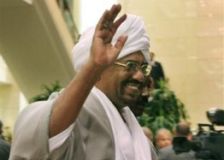Sudan hails UN deal on Darfur, but differences remain
Nov 20, 2006 (KHARTOUM) — Khartoum on Monday hailed a new agreement with the United Nations over peacekeepers in war-torn Darfur as a diplomatic breakthrough for Sudan, but said serious differences remain over the force’s make-up and command.
 It was the first official word by President Omar al-Bashir’s government of its acceptance of the deal, announced Thursday in Addis Ababa. But there were signs Khartoum could still resist the robust U.N. deployment to bring an end to the bloodshed in Darfur.
It was the first official word by President Omar al-Bashir’s government of its acceptance of the deal, announced Thursday in Addis Ababa. But there were signs Khartoum could still resist the robust U.N. deployment to bring an end to the bloodshed in Darfur.
U.N. chief Kofi Annan said the deal calls for a mixed U.N.-African Union force of up to 20,000 troops. If so, that would mean a dramatic reversal of Khartoum’s staunch resistance to deploying U.N. troops in Darfur
But the Cabinet statement on Monday spoke only of U.N. “assistance” to the African force and depicted the agreement as a defeat for a Security Council resolution that called for a peacekeeping force fully under the U.N.
The Cabinet, which gathered Sunday, “backed the outcome of the (Sudanese) government meetings … concerning the provision of a package of assistance from the U.N. to the African Union,” the official SUNA news agency said.
SUNA said al-Bashir and his government “showed happiness over what it sees as a diplomatic victory over those who have been advocating” for the application of Security Council resolution 1706.
The agency said the president and his ministers still have “differences of viewpoints” with the U.N. on whether the force commander should be from the African Union, or simply from the African continent. The Cabinet also has objections on the actual size of the force, SUNA said.
But these issues are “a technical matter that could be resolved, and not a political one,” it quoted the Cabinet as concluding.
The comments could signal that Sudan will try to undermine the U.N. role in the force in talks over its make-up. But it could also be playing down the significance of backing down from its refusal to allow any U.N. presence.
Deploying a bulked-up peacekeeping force is crucial to hopes of bringing calm to Darfur, where more than 200,000 people have been killed and 2.5 million driven from their homes. The 7,000 African Union peacekeeping force already there has been unable to stop the bloodshed.
When the deal was announced Friday, the U.N. and AU said that all parties, including Sudan, had agreed in principle on a “hybrid operation.”
Under the agreement, the troops for the force would be “as far as possible” from African countries,” but “backstopping and command and control structures will be provided by the UN,” the joint statement said.
Sudanese Foreign Minister Lam Akol later insisted Khartoum had never agreed to a “mixed force” but instead to one in which AU soldiers and command would merely receive support from the U.N.
Samani al-Wasila, a Sudanese state minister for foreign affairs, repeated Monday in Cairo that the “agreement does not give the right to the international troops to intervene in the region.”
Party hard-liners have fiercely opposed any U.N. presence in Darfur, with al-Bashir at one point even saying he would personally lead armed resistance to U.N. peacekeepers.
This stance appeared to be softening.
The official army newspaper Al-Quwat Al-Musalaha quoted the spokesman for Bashir’s National Congress Party as saying it strongly backed the government’s rejection of Resolution 1706. But the spokesman, Ibrahim Ahmed Omar, suggested the party had accepted the notion of a hybrid mission, saying “We will not accept that the U.N. have the full command of the African Union force in Darfur.”
But some U.N. officials worry Khartoum was only biding time to let its army and militia rampage through Darfur.
Another official, U.N. humanitarian chief Jan Egeland said Sunday that army support for janjaweed militamen has only increased and that the forces are killing civilians on a daily basis. The Sudanese government denied the claim.
(AP)
